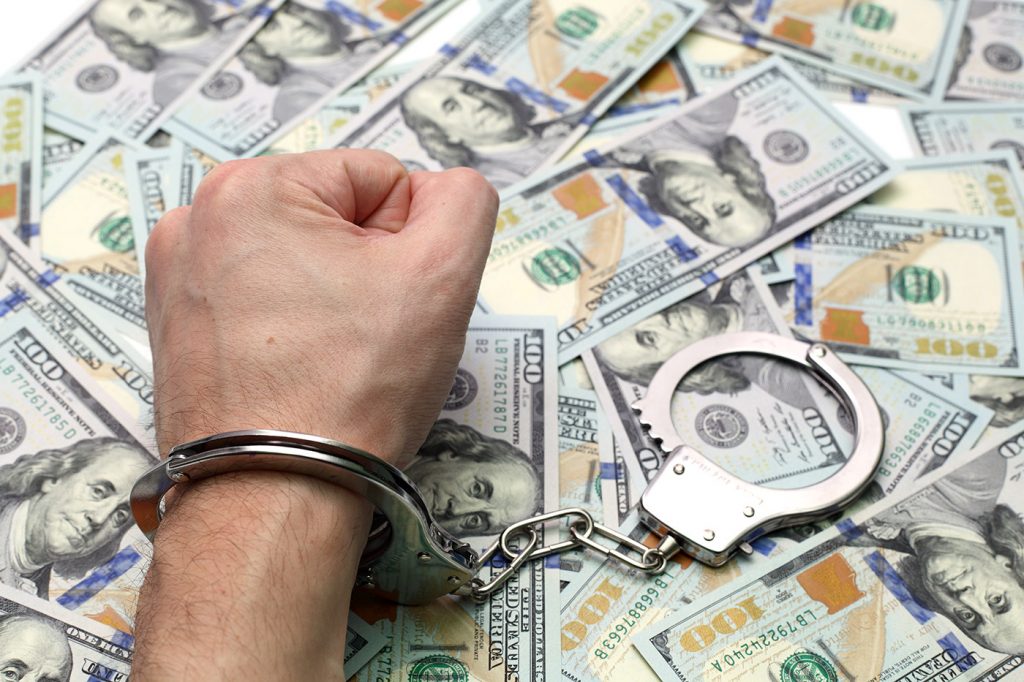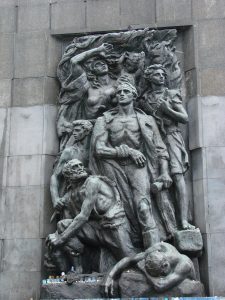Kalief Browder, an African American sixteen year old from the Bronx in New York City, was walking home from a party with his friend when he was stopped by police unexpectedly and charged with an alleged theft in 2010. The accuser, Roberto Bautista, was sitting in a police squad car and identified Browder and his friend as the thieves. The theft was a backpack that was said to contain $700 dollars, a credit card, and an iPod Touch. In his interrogation, with police, Kalief Browder insisted that he had not robbed anyone and that neither the backpack nor its contents would be found in his possession. Browder and his friend were then taken to the precinct where they were processed and taken to central booking. Within the following 48 hours Browder was interrogated and charged with robbery, grand larceny, and assault. At arraignment, bail was set at $3,000 dollars. If Browder’s family used a bondsman the amount would be ten percent plus fees or around $900 dollars for his bail to the bondsman. The bondsman would then post the entire bail amount with the court. The family could not pay $900 resulting in Browder remaining imprisoned at Rikers Island for the next three years.1


Debtors jail in colonial America was used to lock up those who owed money to the government. In today’s society, it translates into the cash bail system. 4 The for-profit bail system in the United States is used to keep those who are accused of breaking the law from harming anybody else or to be sure the accused will appear in court. If the accused is unable to pay the bail at the time of the arraignment, they may use a bondsman or they will remain incarcerated until their trial. For the poor, it is the latter. For Kalief Browder it was the beginning of the end. Only two countries in the whole world have a cash bail system, the United Sates and the Philippines. The cash bail system results in unnecessarily imprisoning citizens who do not pose as a threat to society and who most likely are not a flight risk. No pre-trial information is given to a judge before setting bail and there are no set standards on setting the amount for bail per case.5 Those who are wealthy enough to pay avoid the scarring effect prison has on one’s life. But for those who cannot afford bail, they face violence behind bars, debt, isolation, and at minimum a harsh punishment for those later found innocent, as in Kalief Browder’s case. This has created a two tier system in our judicial process. The first tier are wealthy offenders who can post bail and the second tier is everyone else who cannot afford equal justice or treatment.
Statistics show that 60 percent of people in jail from 2005 to 2015 were in jail awaiting trial. Three fourths of these individuals were accused of nonviolent crimes.6 This is alarming. On a national level, the United States imprisons persons who are essentially living in poverty and who are more susceptible to being involved or accused of a crime. In some instances, the court can grant “release on one’s own recognizance” or ROR. However, this is determined on a state by state standard. An example of this would be New York, the judicial system there would be more willing to grant ROR if the individual has a cellphone, has had a New York address for a year and has a job.7 These may seem like easy standards to meet, but consider those who are homeless, unemployed or cannot afford a cellular service on a regular basis. Their fate rests upon pre-trial bail. The bail money that the defendant does not have, requiring a bondsman, but not always attainable either.

- Johnson, Stephon “‘Time: The Kalief Browder Story’ Shows Failure of Justice System” New York Amsterdam News, March 2, 2017 http://blume.stmarytx.edu:2048/login?url=http://search.ebscohost.com/login.aspx?direct=true&db=a9h&AN=121613807&site=ehost-live&scope=site. ↵
- Schwirtz, Michael, and Michael Winerip “Kalief Browder, Held at Rikers Island for 3 Years Without Trial, Commits Suicide” The New York Times June 08, 2015 https://www.nytimes.com/2015/06/09/nyregion/kalief-browder-held-at-rikers-island-for-3-years-without-trial-commits-suicide.html. ↵
- Schwirtz, Michael, and Michael Winerip “Kalief Browder, Held at Rikers Island for 3 Years Without Trial, Commits Suicide” The New York Times June 08, 2015 https://www.nytimes.com/2015/06/09/nyregion/kalief-browder-held-at-rikers-island-for-3-years-without-trial-commits-suicide.html. ↵
- Steinberg, Robin “Robin Steinberg: What If We Ended the Injustice of Bail?” TED (June 18, 2016.) Https://www.youtube.com/watch?v=3B24RaqA33k . ↵
- Lally, Sean “Can the U.S.Radically Alter Its Cash Bail System?” (October 23, 2017) https://attorneys.us/can-u-s-radically-alter-cash-bail-system/. ↵
- Gunasekera, Yousha “Bail Means Jail: Debtor’s Prison for the Unconvicted.” Progressive 81, no6 (August 2017): 56–59 http://blume.stmarytx.edu:2048/login?url=http://search.ebscohost.com/login.aspx?direct=true&db=a9h&AN=123986116&site=ehost-live&scope=site. ↵
- King, Elizabeth “Inside the Fight to End Cash Bail” Pacific Standard January 08, 2018 https://psmag.com/social-justice/meet-the-reformers-taking-on-alec-to-end-cash-bail. ↵
- “Bail Bond Services for Waco, Texas” Kocian Bail Bonds December 14, 2015 https://www.bailbondskocian.com/. ↵
- “Bail Reform” Official Website – Assemblyman Rob Bonta Representing the 18th California Assembly District (March 29, 2018) Accessed September 21, 2018 https://a18.asmdc.org/article/bail-reform. ↵
- Gonnerman, Jennifer “Before the Law” The New Yorker December 08, 2017 https://www.newyorker.com/magazine/2014/10/06/before-the-law. ↵



123 comments
Adrian Cook
It’s sad the way our judicial system is set up and this is continuing to happen on a daily basis. I feel so sorry for the family of Kalief Browder and how Rikers Island affected him in a psychological way. It’s crazy to think that just by your economic status or race you can be targeted for crimes you haven’t committed. There are a lot of different police and court reforms that need to take place to protect the citizens of our country and protect their innocence. Very interesting article and definitely brings a big problem to light.
Daniela Duran
This was a very interesting article! I can’t believe that so many people are unfairly imprisoned, just because they are unable to pay a bail that is only meant to raise money for a bail system! It sounds totally unfair, and a complete violation of the human rights, just as you said. Kalief Browder is just an example of the huge burden and suffering that this kind of system can cause in an individual, because we must remember that it is not just about the money: being in jail is one of the most traumatizing experiences, and Kalief Browder was the perfect example of this. Certainly, it would be good to have some kind of movement that tries to stop this injustice.
Micaela Cruz
Prior to reading this article, I had not known much about the for-profit bail system in the United States. The author of this article chose an important and relevant topic to write about and the inclusion of a true story allows the audience to have a better perspective of the major issue in our country. The way people who cannot afford to put up bail for release is unjust and I agree with the author when it was stated that this system contradicts our human rights. Great article.
Greyson Addicott
This article was informative to say the very least. It seems to me like the police had no inherent right to imprison a person without evidence. If Browder had a lawyer fighting for him, he would certainly receive state funds in reparation. However, in regards to the statistic provided, that almost 60 percent of people are currently awaiting trial, is not personally surprising to me in the slightest. Indeed, there are more accused criminals than there are courts in the world; Lawyers exist to find middle ground before the court, and, in this specific case, Browder was a victim of that system.
Harashang Gajjar
Whether or not you are in jail should not depend on your ability to pay for your freedom. Yet that’s the way our current money bail system works. It is one of the most corrupt and broken parts of our justice system, Close to half a million people are in jail today awaiting trial, many of them incarcerated because they are too poor to afford cash bail. The time has come to abolish this system. The ACLU Campaign for Smart Justice is launching a nationwide campaign today to end this injustice of wealth based incarceration, deploying all of our tools from our nationwide state affiliate structure to our strategic litigation, communication, and legislative advocacy to support bail reform movements and our partners in states across the country.
Ysenia Rodriguez
The story of Kalief Browder is completely tragic and disturbing. He was innocent and booked without the slightest piece of evidence, yet he was incarcerated for three years and due to his his experience in jail, he committed suicide. This topic of for-profit bonds has never crossed my mind however this article has given me an insight on a problem I feel everyone should know about. Thank you for this well written and informational article.
Eric Ortega Rodriguez
Wow, this was a very fascinating article, especially because it involves the for-profit bail systems. It is unfair that poorer people do not have the same opportunity as wealthy people to bail out of jail even though they might have committed similar nonviolent crimes. The case Kalief Browder is also very sad, although he was considered innocent in the end, spending time in jail changes an individual drastically and unfortunately, this led to Browder committing suicide.
Lyzette Flores
Wow, I had never heard of Kalief Browder’s story but I am very glad I did. I totally agree with the last picture stating “Poverty is not a crime” because indeed is not. Many people are accused of crimes they did not commit and then they are stuck having to pay for a bond in order to be released. This is obviously not an issue for wealthy people but what about the poor? I believe something must be done in order for it to be fair for all.
Angel Torres
Kalief Browder’ story is a tragic example of the two-tier system the United States has as a result of the cash bail system. The cash tier system is an unfair form of bail due to the fact that there are many people that are not unfortunate enough to be able to afford bail, compared to those individuals that are able to afford bail. Unfortunately, the criminal justice system accuses innocent people of crimes they do not commit, those people that are innocent and impoverish are hurt more in the cash bail system. Great article that shows the injustice behind the cash bail system and the criminal justice system.
Jose Sanchez
This was a very well written article. It was also very informative. I always thought that the bail system how it worked in the United States was standard throughout the rest of the world. It just goes to show that the justice system works against minorities and those of the lower class. The bail system is an outdated system that must be changed.